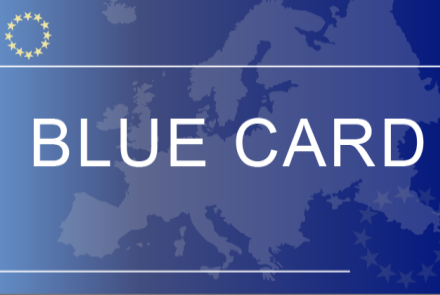EU Blue Card (EU Directive)
The EU Directive 2009/50 dated May 29, 2009 (the so-called “EU Blue Card Directive”) was developed and introduced with the aim of increasing the attractiveness of the EU countries for highly qualified specialists from third countries, namely, for:
- creating a favorable “climate” for foreign specialists in the EU labor market,
- harmonisation of conditions for their entry and movement throughout the EU,
- improving their legal status, giving families of the indicated category of workers the right to live and work in the countries of the community.
At the same time, the goal was to limit the outflow of students from third countries who graduated from European universities, who were willing and able to work in the EU.
Four years of experience using the EU Blue Card has shown that in some countries, such as Italy, France, Spain, the Directive has been positively adopted and is widely used to date. On the contrary, in Austria, Belgium, and Holland, for example, alternative employment opportunities and legal residence of highly skilled workers are legally defined, which, given the local characteristics, appear even more favorable than the Blue Card.
Terms of issue of the EU Blue Card by EU countries.
The basic requirements for obtaining a Blue Card, in accordance with Article 5 of this Directive, are:
- an employment contract or a letter of guarantee from an employer with a salary of at least 1.5 times the average gross annual salary (it is possible to lower the salary threshold to 1.2 for some professions that are needed in this country);
- for licensed professions, documents confirming that the employee meets all the requirements stipulated by the conditions for issuing a license;
- for unlicensed professions, documents proving the relevant higher professional qualifications of the employee.
Highest professional qualification is determined by:
- higher education, confirmed by a diploma issued on the basis of a three-year post-secondary education program (for citizens of Russia - this is a diploma confirming the award of a Bachelor's degree),
- or five years of professional experience at a level comparable to the qualifications of higher education, and correlating with the professional duties of the employee, as determined by the employment contract.
Rights of owners of EU Blue Card.
Blue Card holders and their families are entitled to:
- enter and reside in the territory of the country that issued the document, as well as move through the territory of other EU countries;
- work in the territory of the country that issued the document (taking into account restrictions on changing the company, on the basis of an employment contract with which a decision was made to issue a Blue Card for the main applicant);
- on social insurance, pensions, diplomas, education and vocational training.
In accordance with the Directive, after two years of legal employment in the territory of one of the EU countries, they can gain access to any highly qualified work in this country along with its citizens.
After 18 months of employment and residence in one of the EU countries, they can be employed as a highly qualified specialist in a company registered in another EU country (taking into account the requirements of the Blue Card holders in this country and the restrictions imposed on the employment of representatives of other countries).
It is envisaged that the Blue Card holder and his family are free to enter and remain in the territory of all EU countries, provided that the authorities are notified within one month from the day of arrival.
The authorities of the state into which the owner of the Blue Card entered may restrict the right to work in their country until the holder receives the appropriate work permit. However, an application for permission can be submitted even while working in the country that issued the Blue Card, and in the country that issued the BlueCard.
Implementation.
The directive was to be enforced by law by each EU member state by June 19, 2011. Most states have now complied with the requirements of the Directive, however, the United Kingdom, Ireland and Denmark have refused to participate and, therefore, the relevant provisions do not apply in their territories.
Despite the fact that more than 4 years have passed, most experts believe that it is too early to judge the real extent of the implementation of the Directive, since the first results of this kind will appear only in 2015.
Nevertheless, in 2012, 3,664 cards were issued, of which in Germany (2,584; 70.5%), in Spain (461; 12.6%), in Luxembourg (183; 4.99%). On the other hand, in Poland, Portugal and Finland, 2 cards were issued, 1 in the Netherlands and Hungary, 1 in Belgium, Cyprus, Greece, and Malta.
Most of the card’s holders came from India (699), China (324), USA (313) and Russia (271), Ukraine (149). In total, documents were provided to citizens of 96 countries.
In 2013, the total number of EU BlueCard increased to 15,261. The three leaders were Germany (14197), Luxembourg (306), France (304).
The numbers above are just mean statistics. On the other hand, many experts believe that the Directive has not yet achieved its main objectives due to the fact that the owners of the EU Blue Card, in fact, can work and be located only in the country that issued the EU Blue Card. Relocation and, especially, employment in other EU countries still remains a subject of certain disputes and requires legislative regulation.
Another problem is related to significant inequality of income and qualification requirements in different EU countries. In particular, after receiving the EU Blue Card in a low-income country, moving to work for a “prosperous EU member” is not considered an action aimed at real and effective regulation of the labor market across the EU.
According to experts, at the moment the provisions of the Directive have little effect on the effective redistribution of human resources legally residing in the EU and do not contribute to overcoming regional imbalances between EU countries. In addition, qualified specialists continue to experience difficulties at almost all stages: from nostrification of education documents to the procedure for acquiring citizenship. The low level of mobility between EU member states has remained unchanged.
But there is no doubt that the EU Blue Card program, despite its imperfection, can and should be developed. Moreover, relying not only on their own positive experience, but also the experience of other similar systems, such as the RWR Card in Austria or Tier in the UK.
Now, we briefly outline how the Directive works in individual EU countries. It should be noted here that we rely primarily on our personal experience and the experience of our colleagues from foreign law firms.
Belgium. It is not one of the countries where the Blue Card is widely distributed, but the program works and there are no bureaucratic obstacles for its implementation. The contract with the employer must be concluded for a period of at least one year. The minimum wage is 51,000 euro per year.
The requirements for education (qualifications) are very ordinary - three years plus a higher education institution should be recognized by the Ministry of Education of the state that issued the diploma.
Blue Card is issued for a period of 13 months with subsequent renewal for another 13 months, after which the applicant receives a Blue Card for a period of 3 years. The main practical drawback of the system is the unjustifiably high level of wages required. Also, Belgium uses the national system, according to which to obtain a category B residence permit for highly qualified specialists, it is enough to provide a wage level of 20% less than the Blue Card system.
Hungary. The Blue Card Directive was introduced in law in June 2011. However, in practice, using it is extremely problematic, since the legal status of highly qualified employees and the procedure for their employment remain unclear in detail.
Moreover, the government reserves the right to regulate annual quotas for issuing work permits to third-country nationals, including the number of Blue Card issued. Formally, the annual salary should be at least 15,000 euro. An employment contract drawn up at the time of application is “hard”, not subject to review by the employee or employer, and on an almost perpetual basis.
Unfortunately, it should be noted that Hungary is not yet among the countries trying to develop the Blue Card system to attract foreign labor. Therefore, we would not recommend the use of this procedure for employment in Hungary.
Germany. One of the first to declare its participation in the program, and having achieved the most noticeable results (at least in terms of the number of relevant permits issued), Germany is still in no hurry to declare that it has achieved success in the implementation of the Directive and intends to improve the legislative framework in this area.
Although the law does not specify a minimum duration of a contract, in practice preference is given to employment contracts with a duration of at least one year.
The initial salary threshold was set at 44,800 euro, with a “relaxation” of up to 34,499 euro for representatives of scarce professions: engineers, scientists, medical workers, IT specialists. Subsequently, this threshold was adjusted and reached 47,000 and 37,000 euro, respectively (although one should not expect that the minimum possible wages will inspire immigration authorities to make a positive decision).
Certain preferences are allowed in relation to companies registered in East Germany, for which the threshold was 38,400 euro. The maximum period for which the Blue Card is issued must comply with the employment contract and is limited to four years.
The main problem faced by German companies applying for a Blue Card for their employees is that in Germany there are no restrictions on transferring Blue Card holders to another company. This rule does not suit employers and often pushes them to refuse to use blue cards.
Greece. Obtaining a Blue Card on the Balkan Peninsula is the least expensive procedure compared to other EU member states. The basic conditions for this are standard: a contract with a term of at least one year, an annual salary of at least 12,000 euro, a university degree or a five-year work experience. The initial issue period is 2 years. Subsequently, an extension of another 3 years.
The Directive is currently suspended. Only specialists from third countries who are employees of international corporations at the time of the application can use the program.
Spain. Local companies quickly responded to the introduction of the Directive, and the cards were duly distributed in many business areas and for various types of activities.
The following requirements are set for Blue Card holders. The minimum wage should be at least 1.5 times the minimum wage determined annually by the Spanish National Institute of Statistics (INE). Currently, the recommended level is 35,000 euro.
In contrast to the general European provisions of the Directive, in Spain it is mandatory to have four years of study at the university or at least three years if the training was directly related to the position held.
Cards are usually issued for a period of one year, followed by an annual renewal.
According to experts, one of the main reasons why the Directive was distributed in Spain was the possibility of employing family members of a highly qualified specialist, as they are automatically issued with a work permit in Spain.
Unfortunately, it is not always possible for applicants to receive a Blue Card to avoid a test for compliance with labor market requirements. The latter circumstance complicates and prolongs the procedure, although it does not exclude the possibility of its successful completion.
Italy. The popularity of the Blue Card in Italy is inextricably linked with the peculiarities of the quota system, which determines the number of work permits allocated by the government for the employment of highly qualified specialists from third countries. The procedure for issuing quotas was and remains unpredictable, the number of quotas, as a rule, is small. As a result, Italian companies have practically no opportunity to hire relevant employees, despite their urgent need in a number of areas, such as IT-technologies, telecommunications and communications, aircraft manufacturing, etc.
In accordance with the law, the minimum wage is 25,000 euro, although in practice, this amount should be increased to 30,000 and higher, depending on the position of the applicant and the number of members of his family.
Regarding the implementation of the Directive, the main problems are related to the relatively long term for the recognition of diplomas by Italian consulates abroad. The requirements for nostrification of documents and the time for making a decision vary from consulate to consulate, and some of them (consulates) unreasonably complicate the procedure, sometimes artificially delaying its implementation. After the nostrification process is completed, a work permit is issued by the Immigration Service at the place of the applicant's future “residence” within one to two months. The exception (in terms of time) is only Rome and Florence, two regions in which work with documents is delayed, as a rule, for a few more months.
Luxembourg. Again, the requirements for education - having a diploma or qualification - 5 years, are standard. The contract must be concluded for a period of at least 1 year.
The requirements for wages are very high: 69,858 euros for most professions, 55,890 euro for researchers, engineers, IT specialists, etc., that is, specialists in professions falling into the first and second classes, in accordance with the international classification of ISCO.
The term for which the Blue Card is issued is initially 2 years, followed by extension.
A distinctive feature of the conditions for obtaining "blue cards" in Luxembourg are tax incentives provided to employers. So, if the employer covers the costs associated with moving, living, as well as the transportation costs of the holder of the Blue Card, then these expenses are related to the operating expenses of the employer and are not taxed either by him or by a highly qualified specialist.
Netherlands. The minimum salary threshold is EUR 61,000. Nostrification of a diploma is not an obstacle, as this is an official procedure carried out by the government organization IDW. Verification can be done not only using the original diploma, but also a copy or transcript. The check takes two weeks. Only after verification, an application for a Blue Card can be issued.
The popularity of Blue Card in the Netherlands is very relative. In 2012, only ten cards were issued, while in 2011 only three cards were issued. An alternative opportunity - the national system of employing highly qualified specialists - provided employment for about 13,000 employees in 2011 and 2012.
The attractiveness of the national system is that within its framework, the salary threshold is significantly lower (EUR 53,000 euro). However, there is no need to provide a diploma of higher education and engage in nostrification of relevant documents.
Czech. Despite the fact that the Blue Card system has not yet received proper development in the country, there are no special problems for its implementation.
The contract with the employer must be concluded for a period of at least one year, then the validity of the Blue Card will be one year and three months. The minimum wage is set at 18,000 euro.
The validity period of the cards must be at least the validity of the labor contract and, as a rule, is limited to one year “from below” and two years - “from above”. After two years, the Blue Card is extended, in most cases, for another two years.
Czech law has identified two significant nuances regarding the use of blue cards. Namely, the Czech government defines a list of vacancies that applicants can apply for. At the same time, only those vacancies for which it was not possible to find applicants either in the Czech Republic or in other EU countries are included in the list.
During the first two years of using the Blue Card, its holder theoretically has the opportunity to terminate the employment contract with which he initially received the Blue Card, replacing it with a new one, for example, with another employer. But in practice, for this he will need permission from the Ministry of Internal Affairs.
After two years, a notification system, i.e. it is enough for the owner of the Blue Card to inform the Ministry of Internal Affairs within three days about a change of job.
France. The minimum contract period is one year. The threshold for annual wages is 53,000 euro.
The main practical problem is the need for nostrification of the diploma - a procedure carried out by CIEP (International Center for Advanced Methods in Education). As a result, there was a situation when it is easier to get a Blue Card on the basis of a five-year qualification than to go through the CIEP crucible. Moreover, the level of qualification can be proved by presenting one or more reviews from previous employers. At the same time, it is important that similar positions be held in the past and work of comparable qualifications is carried out.
Issued for a period of 3 years with subsequent renewal.
Currently, Blue Card is widely used by French companies and for this there are the following reasons:
- the authorities are constantly tightening the criteria for issuing work permits for the movement of highly qualified employees within affiliated companies (ICT),
- Blue cards can be used for the purpose of obtaining a permanent residence, which in practice is unattainable for ICT. However, it is important to emphasize that it is difficult for an employee already working in France to change their status and receive a Blue Card. Therefore, the Blue Card is mainly issued to persons traveling to France for the first time.
Sweden. The Blue Card Directive entered into force on August 1, 2013, preceded by a change in a number of laws on aliens and immigration in Sweden.
To receive a Blue Card in Sweden you must have:
- - higher education or five years of professional experience,
- - annual salary of at least 62,000 euro.
The minimum period for which the Blue Card is provided is 1 year.
It is fair to admit that so far there is no experience in obtaining a Blue Card in Sweden. Today we are talking about issuing just a few cards, so it is difficult to conclude about the problems and advantages of using the procedure in Sweden.
If you are interested in more detailed information on the Blue Card conditions in one of the listed countries, please call and we will answer all your questions and assist in the paperwork.






